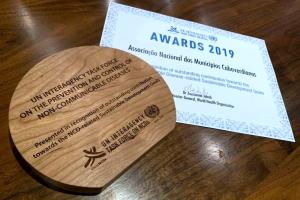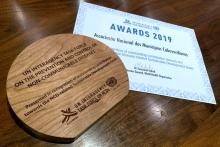Cabo Verde awarded for its engagement in the prevention of noncommunicable diseases through its Healthy Cities initiative
In recognition of its health promotion commitment through the Healthy Cities initiative, the National Association of Cabo Verdean Municipalities was awarded a distinction for Outstanding Non-State Actors – a category including Non-Governmental Organizations, Universities and Philanthropy – from the United Nations Interagency Working Group for the Prevention and Control of Noncommunicable Diseases.
The National Association of Cabo Verdean Municipalities was nominated by the World Health Organization (WHO).
The award was presented during the 74th General Assembly of the United Nations to the Prime Minister of Cabo Verde, Dr Ulisses Correia e Silva, accompanied by the Coordinator of the Healthy Cities Implementation Support Unit of Cabo Verde, Helena Rebelo Rodrigues.
"On 23rd September, we proudly received the United Nations Inter Agency Task Force (2019) Award for our Healthy Cities initiative at the United Nations in New York. I believe that the construction of healthier and happier cities is a commitment of all and for all so that no one is left behind," the Prime Minister wrote in a post on his official page.
"We managed to create a multisector approach to health, prioritizing the local scenario, putting health in all policies and addressing the main risk factors for the health of citizens throughout the life cycle,” added the Prime Minister.
The Healthy Cities Movement was introduced in 2016 through a protocol established with the National Association of Cabo Verdean Municipalities, with institutional and technical support from WHO. It was the first country in the African region to embrace the WHO Healthy City approach and led the development of an innovative and unique model of governance between the central Government and local governments, according to the Prime Minister.
Cabo Verde was similarly awarded in 2018 for its commitment in achieving the targets of the Sustainable Development Goals related to health, in particular to noncommunicable diseases. That year, the United Nations recognized the President of Cabo Verde for his engagement in combating alcohol abuse through the campaign Mais Vida Menos Álcool (More Life Less Alcohol).
The 2019 awards ceremony took place on the sidelines of the United Nations High-Level Meeting on Universal Health Coverage. According to Rodrigues, "Healthy cities are the structuring element to make islands and the whole country healthy, facilitating healthy urban planning and promoting preventive measures in communities and primary health care structures."
The development of healthy cities and islands is a pillar of the National Health Promotion Plan of Cabo Verde (2018–2021), elaborated with the support of WHO, and it was featured during the WHO African Health Forum that took place in Praia City in March of this year.
WHO supported Healthy Cities advocating for donors’ engagement with the initiative. As a result, the Government of China through its embassy has funded the development of the Healthy Cities and Islands movement in Cabo Verde since March 2019. Likewise, WHO has provided technical training on its Healthy Cities methodology to more than 60 technicians from 12 municipalities in the country. The country's mayors have since integrated the methodology to support municipal projects and become members of the Healthy Cities network.
Moreover, the approval of the Draft Project of Healthy Cities Network of the Community of Portuguese-Speaking Countries (CPLP) during the Summit of Heads of State and Government, on the island of Sal, in July 2018, "will allow sharing the Cabo Verde model to a community made up of about 274 million citizens," concludes the Coordinator.




